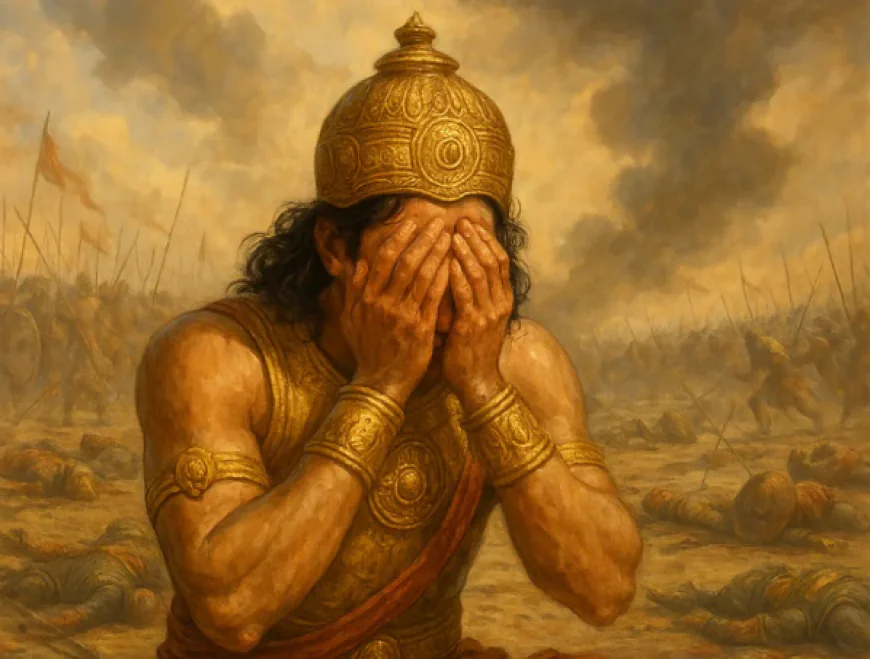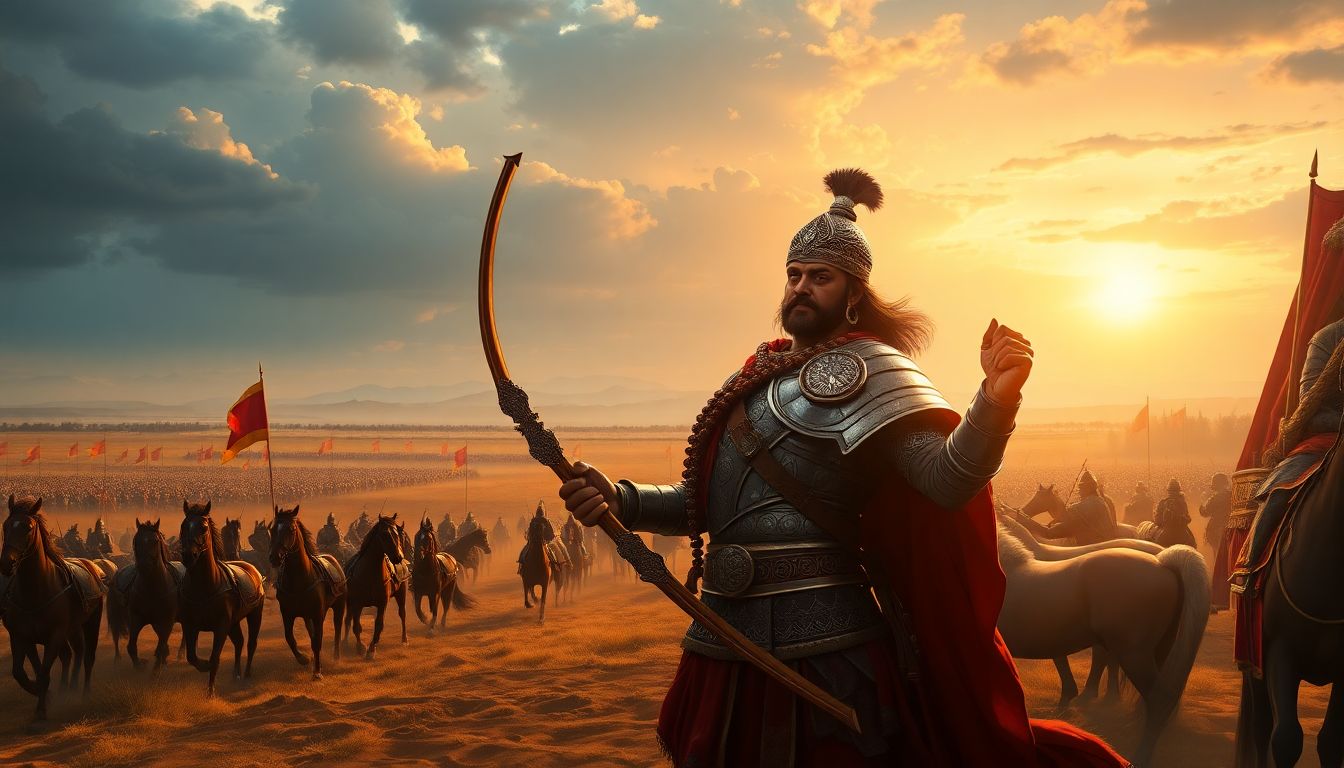Arjuna’s Dilemma Explained: Moral Conflict in the Bhagavad Gita and Its Modern Relevance
Explore Arjuna’s inner conflict in the Bhagavad Gita’s Arjuna Vishada Yoga. Learn how this ancient moral dilemma on the battlefield offers timeless wisdom for facing life’s toughest decisions today.

Introduction
Imagine standing on the edge of a battlefield, weapon in hand, ready for war. But suddenly, doubts flood your mind. You see your family, friends, and teachers ready to fight against you. This moment captures Arjuna's deep moral crisis just before the great Kurukshetra war. It’s a story that resonates even today—everyone faces tough decisions, inner doubts, and questions about right and wrong.
The Bhagavad Gita steps in here as more than just a scripture—it’s a guide to navigate life’s moral struggles and inner conflicts. It shows us how to find clarity and strength amid confusion.
The Context of Arjuna’s Dilemma in the Mahabharata
Background of the Kurukshetra War
The Mahabharata, an ancient Indian epic, tells a story of two mighty groups fighting for power. On one side are the Pandavas; on the other, the Kauravas. The rivalry runs deep, and the battle is not just about land—it's about righteousness and justice.
The war’s stakes involve the fate of kingdoms and morals. Both sides claim to be doing what’s right, but the conflict is clouded with questions about truth and duty.
Who is Arjuna?
Arjuna is the brave warrior prince of the Pandavas. He’s known for his skill and courage in battle, and he holds a special place as a key character in the story.
As a leader and hero, Arjuna carries the hopes of his family and nation. But beneath his strong exterior, he struggles with moral doubts that threaten to undo him.
The Moment of Crisis
Just before the first arrow is shot, Arjuna feels a sudden wave of doubt. His confidence fades, replaced by fear and sorrow.
He looks at his enemies—many are his own relatives, teachers, and friends. The sight hits him hard, making him question whether fighting in this war is right. This is the turning point that begins his internal conflict.
Understanding Arjuna’s Moral and Emotional Crisis

Psychological Factors Contributing to the Dilemma
Arjuna's mind battles between duty and personal feelings. His core dilemma is:
- Is it right to fight relatives, teachers, and friends?
- How do I reconcile my role as a warrior with my love and respect for family?
His heart is torn between honoring his duty (Dharma) and protecting his kinship bonds.
Philosophical Questions Raised
His crisis isn’t just about warfare—it raises big ideas, like:
- What truly is right and wrong?
- Can it be justified to fight against those we care about?
- What does karma, or action, really mean in this context?
These questions make Arjuna's crisis deeply philosophical.
The Role of Emotions and Compassion
Arjuna’s compassion makes his doubts worse. Seeing loved ones as enemies makes it hard to act.
His feelings of grief and fear cloud his judgment. Still, compassion’s double-edged nature shows that kindness can sometimes create inner turmoil.
The Teachings of the Bhagavad Gita on Moral Dilemmas
Arjuna’s Despondency as a Catalyst for Wisdom
His despair drives him to seek answers beyond the battlefield. This inner crisis becomes a turning point for spiritual growth.
Arjuna learns the importance of surrendering his ego and seeking higher wisdom. It’s in this moment of weakness that true insight appears.
The Core Philosophical Concepts
The Gita introduces key ideas to resolve moral conflicts:
- Dharma and Adharma: Right and wrong, truth and falsehood.
- Karma Yoga: Acting without attachment to outcomes.
- Jnana Yoga: Knowledge that leads to liberation.
- Bhakti Yoga: Devotion and surrender to divine will.
These tools help make sense of difficult moral choices.
Key Verses Reflecting the Dilemma
One famous verse shows Arjuna’s confusion:
"My limbs weaken, my mouth dries up, my body trembles, and my hair stands on end."
Krishna’s counsel here emphasizes duty, faith, and love for the divine, guiding Arjuna through his darkest moments.
How to Apply Arjuna’s Dilemma to Modern Life
Recognizing Personal Moral Conflicts
Many face similar struggles today—whether in careers, relationships, or social issues.
You might feel torn between what’s right and what benefits you most. Recognizing these feelings is the first step toward clarity.
Strategies for Resolving Moral Dilemmas
- Reflect on your core values and what truly matters.
- Think about possible long-term effects of your choices.
- Seek counsel from mentors, or turn to spiritual practices like meditation.
- Find ways to balance duty with compassion, just as Arjuna learned.
Lessons from Arjuna's Dilemma
- Inner clarity comes from understanding your purpose.
- Courage is about facing conflicts with a clear mind.
- Tough times can be opportunities for self-awareness.
- Practical tips include regular meditation, mindfulness, and honest reflection on your actions.
Conclusion
Arjuna’s dilemma isn’t just a story from a distant past—it’s a mirror for our personal struggles. Everyone faces moments of doubt and moral challenge. The teachings of the Bhagavad Gita remind us that wisdom, compassion, and faith can help us navigate through tough decisions.



 VARSHITHA
VARSHITHA